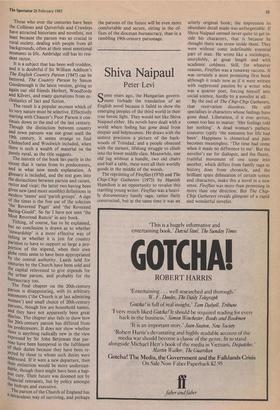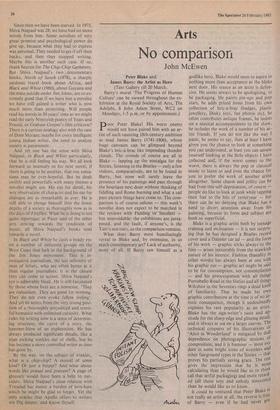Shiva Naipaul
Peter Levi
C ome years ago, the Hungarian govern-
ment forbade the translation of an English novel because it failed to show the emerging peoples of the third world in their true heroic light. They would not like Shiva Naipaul either. His novels have dealt with a world where feeling has gone dead from despair and helplessness. He draws with the utmost precision a picture of the back- woods of Trinidad, and a people obsessed with the earnest, lifelong struggle to climb into the lower middle class. Meanwhile, one old jug without a handle, two old chairs and half a table, these were all their worldly goods in the middle of the woods. ment forbade the translation of an English novel because it failed to show the emerging peoples of the third world in their true heroic light. They would not like Shiva Naipaul either. His novels have dealt with a world where feeling has gone dead from despair and helplessness. He draws with the utmost precision a picture of the back- woods of Trinidad, and a people obsessed with the earnest, lifelong struggle to climb into the lower middle class. Meanwhile, one old jug without a handle, two old chairs and half a table, these were all their worldly goods in the middle of the woods.
The reprinting of Fireflies (1970) and The Chip-Chip Gatherers (1973) by Hamish Hamilton is an opportunity to revalue this startling young writer. Fireflies was a heavi- ly documentary family saga, rather flatly constructed, but at the same time it was an utterly original book; the impression its abundant detail made was unforgettable. If Shiva Naipaul seemed never quite to get in- side his characters, that is because he thought there was straw inside them. They were without some indefinable essential part of man. He wrote like a sociologist, unstylishly, at great length and with academic coldness. Still, for whatever reasons, Fireflies was a runaway success. It was certainly a most promising first book although it reads now as if it were written with suppressed passion by a writer who was a quarter poet, forcing himself into social science, hardly by a novelist at all.
By the end of The Chip-Chip Gatherers, that reservation dissolves. He still specialises in characters whose feelings have gone dead. Liberation, if it ever arrives, comes too late to matter. 'Her feelings told her nothing'. A dead woman's pathetic treasures typify 'the nonsense her life had been'. Happiness is chimerical and pain becomes meaningless. 'The time had come when it made no difference to me'. But the novelist's ear for dialogue, and the fluent, truthful movement of one scene into another, which differs from family saga as history does from chronicle, and the brilliant spare delineation of certain scenes and characters, make this a novel in a new sense. Fireflies was more than promising in more than one direction. But The Chip- Chip Gatherers reveals glimpses of a rapid and wonderful novelist. Since then we have been starved. In 1973, Shiva Naipaul was 28; we have had no more novels from him. Some novelists of very great promise and psychological power do give up, because what they had to express was personal. They needed to get if off their backs, and then they stopped writing. Maybe this is another such case. If so, thank heaven for The Chip-Chip Gatherers. But Shiva Naipaul's two documentary books, North of South (1978), a sharply sardonic travel book about Africa, and Black and White (1980), about Guyana and the mass suicide under Jim Jones, are so ex- tremely good that if we have lost a novelist we have still gained a writer who is now much more than promising. Will people read his novels in 30 years' time as we might read the early Ninetyish poetry of Yeats and Pound, or Graham Greene's film criticism? There is a curious analogy also with the case of Dom Moraes; maybe for every intelligent young Indian writer, the need to analyse society is -paramount.
And yet one has the sense with Shiva Naipaul, in Black and White particularly, that he is still feeling his way. We all look forward so intensely to his next novel, if there is going to be another, that our sensa- tions may be over-hopeful. But he deals swiftly and powerfully with many themes a novelist might use. His eye for detail, his wry observation of character and his ear for dialogue are as remarkable as ever. He is still able to plunge himself into the lower depths of a society as thoroughly now as in the days of Fireflies. What he is doing is not quite reportage; as Pater said of the other arts striving towards the condition of music, all Shiva Naipaul's books tend towards a novel.
In Black and White he casts a beady eye on a number of extremist groups on the West Coast that lurk in the background of the Jim Jones movement. This is in- vestigative journalism, the last infirmity of men of letters, who are often better at it than regular journalists. It is the closest they can come to action. Shiva Naipaul's eye is admirably bleak. He is still fascinated by those whose lives are a nonsense. 'They are redundant. They are good for nothing. They do not even evoke fellow feeling'. And yet he writes from the very strong posi- tion of a thoroughly prejudiced and scorn- ful humanist with unlimited curiosity. What rules his writing now is a sense of determin- ing structure, the curve of a story, the hammer-blow of an explanation. He has always produced significant details, like a man picking winkles out of shells, but he has become a more controlled writer as time has gone by.
By the way, on the subject of winkles, what is a chip-chip? A mussel of some kind? Or just a limpet? And what about words like prasad and pranam? A page of glossary would have been a help to out- siders. Shiva Naipaul's close relation with Trinidad has meant a burden of love-hate which he might be glad to forget. Yet the only oracles that Apollo offers to writers are Dig deeper, and Know thyself.











































 Previous page
Previous page